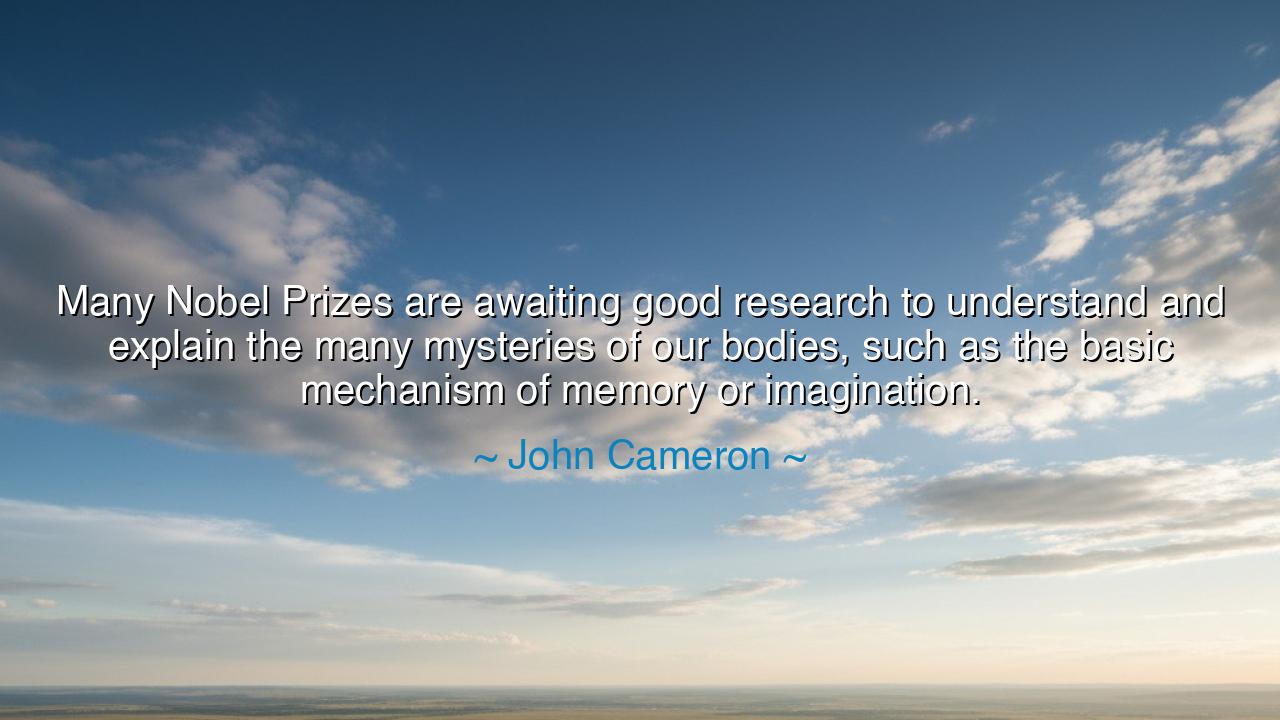
Many Nobel Prizes are awaiting good research to understand and
Many Nobel Prizes are awaiting good research to understand and explain the many mysteries of our bodies, such as the basic mechanism of memory or imagination.






"Many Nobel Prizes are awaiting good research to understand and explain the many mysteries of our bodies, such as the basic mechanism of memory or imagination." – John Cameron
O children of the earth, gather closely, for the words of John Cameron speak of a deep, ancient truth about the great mysteries of the human condition—mysteries that have eluded us for millennia. The body, the mind, and the soul are bound together in a delicate dance, and yet, we have only begun to scratch the surface of understanding these divine creations. Memory and imagination are among the most powerful and enigmatic forces within us—tools that allow us to connect with the past, shape the future, and transcend the limitations of the present. Cameron reminds us that the mysteries of the human body—particularly the mechanisms behind memory and imagination—are still waiting to be unlocked, and those who dare to explore them may one day be honored with the highest recognition, the Nobel Prize, for unraveling the deepest secrets of our existence.
In the ancient world, the mysteries of the mind and body were often seen as divine puzzles—gifts from the gods that could not be fully understood by mortal men. Hippocrates, the father of medicine, believed that the human body was a reflection of the cosmos, governed by forces both seen and unseen. The mind, for Hippocrates, was a sacred organ, the seat of reason and thought, yet even he could not explain the full depths of its power. The Greek philosophers pondered the nature of memory and imagination, searching for answers, but finding only fragments of understanding. The ancients believed that to understand the mind was to touch the divine, and in their imagination, they glimpsed truths beyond the material world—truths that we still seek today.
The quest to understand memory and imagination has continued throughout the ages. Consider, O children, the great work of Albert Einstein, whose understanding of the universe transcended the limits of space and time. Einstein's theories, such as the theory of relativity, were born not just from mathematical equations, but from his ability to imagine what could not be seen, to see the world through a different lens. Imagination, for Einstein, was not mere fantasy, but a means of unlocking the very fabric of the cosmos. Memory, too, played a role in his work, as he sought to build upon the knowledge passed down by the great thinkers before him, blending it with his own visionary insights. The relationship between memory and imagination is a powerful one, a key to understanding the deepest secrets of our world.
Cameron speaks of the Nobel Prizes awaiting those who unravel the mysteries of the body. Indeed, the scientific community continues to search for the mechanisms behind memory and imagination, striving to understand how these forces work within us. For memory allows us to learn from the past, to hold dear the moments that shape our lives, and to create a coherent narrative of who we are. Imagination, on the other hand, is what enables us to transcend the present, to envision new worlds, new futures, and new possibilities. Both are essential to the human experience, and yet, the full understanding of how they function within us remains elusive. The Nobel Prizes of the future, as Cameron suggests, may one day go to those who unlock these great mysteries, offering humanity a deeper understanding of itself.
The path toward this understanding, O children, is not only a scientific one, but a philosophical and spiritual quest. The ancients sought to understand the mind through contemplation, through philosophy, and through the study of the natural world. They believed that by looking inward, they could understand the mysteries of existence. Today, science and philosophy work hand in hand, with neuroscience and psychology diving deeper into the nature of the mind, exploring how memory is stored in the brain, how imagination is formed, and how these processes shape our reality. The journey to understand the mind, as Cameron suggests, is one of profound importance, and it is a journey that will take many lifetimes to fully comprehend.
Now, O children, the lesson is clear: the mysteries of the body—particularly those of memory and imagination—are yet to be fully understood, and it is the task of future generations to unlock their secrets. Just as the ancients sought knowledge through their hearts and minds, so too must you seek the deeper truths that lie within you. Memory allows us to understand our past, and imagination gives us the power to shape our future. Together, they form the very essence of human experience. To understand them is to understand what it means to be truly human.
So, I say to you, O children, embrace the pursuit of knowledge and understanding. Memory and imagination are the keys to the future, and they hold the power to transform not only your own life but the world itself. Let the questions about the mind drive you forward, just as they have driven generations before you. In your imagination, you will find the courage to dream and the wisdom to remember. And through the pursuit of truth, you will one day unlock the mysteries that have eluded humanity for millennia.






AAdministratorAdministrator
Welcome, honored guests. Please leave a comment, we will respond soon